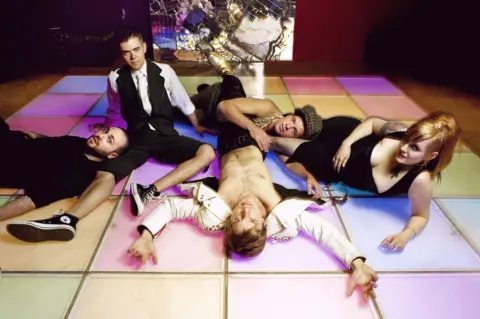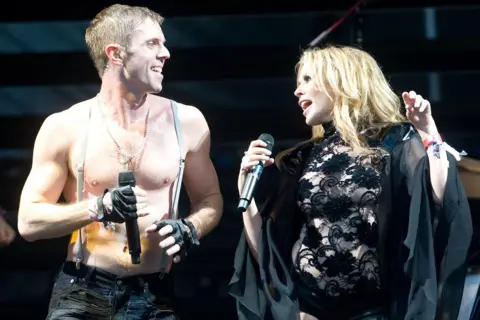Scissor Sisters spill the beans on their comeback
Scissor Sisters, one of pop’s most colourful bands, have announced they are reuniting, 12 years after declaring an “indefinite hiatus” live on stage.
The US group will play a 10-date UK tour in May 2025, marking the 20th anniversary of their chart-topping debut album, also called Scissor Sisters.
“It’s wild,” frontman Jake Shears tells BBC News, reflecting on the band’s success. “It feels like yesterday, and then it also feels like a really long time ago.”
Founding member Ana Matronic has decided not to join the comeback shows, but the band say they will honour her on stage.
“It gives us an opportunity to do things in kind of a different way,” says keyboard player and bassist Scott “Baby Daddy” Hoffman.
“Not to replace Ana in any way, but to get some people on stage and ask some friends to do fun things.”
Asked whether the guest stars could include Rebecca Lucy Taylor, who co-starred with Shears in the London production of Cabaret last year, the band are enthusiastic
“God, I love her so much,” Shears says. “I feel lucky to be on the stage, any time I’m on stage with her.”
“It’s a great idea,” adds Baby Daddy. “Maybe she’ll come do some songs.”
Whatever happens, Shears promises a “little bit of chaos and anarchy” on the stage.
“That’s the magic ingredient and we’re definitely gonna bring that ‘anything can happen’ energy again.”

Scissor Sisters – pictured here in 2004 – were part of the last generation of bands to emerge organically from club culture, before music went terminally online
Scissor Sisters were born in New York’s queer nightlife scene, and burst onto the charts with their fluorescent cover of Pink Floyd’s Comfortably Numb in late 2003 and early 2004.
Their debut album was the UK’s best-selling record of 2004, earning them three Brit Awards and further chart hits with larger-than-life pop anthems such as Take Your Mama and Filthy/Gorgeous.
They topped the singles chart in 2006 with I Don’t Feel Like Dancin’, co-written with Elton John, and scored further hits with the power ballad Fire With Fire and the Calvin Harris-produced Only The Horses.
After four albums, they announced they were taking a break during the final night of a residency at London’s Roundhouse.
“This will be the last time we will play in London for quite some time,” Shears told the sold-out venue.
Unfinished business
Looking back, the star says he wanted to leave the band on a high – following the break-out success of the drag-inspired single Let’s Have A Kiki, which remains a fixture at gay bars and Pride events.
“Kiki was such a sensation, and it was so unexpected,” he says.
“At that moment, I was like, ‘I don’t know if I’ve got anything left to say through this filter’.
“Baby Daddy wanted to do graphic novels, and Del [Marquis, guitarist] was doing interiors. We all had our different fascinations we wanted to explore.”
In the intervening years, Shears released two solo albums and wrote the Broadway musical Tammy Faye with Elton John; while Baby Daddy balanced his literary ambitions with songwriting gigs for Kylie Minogue, Tinashe and Demi Lovato.
The reunion spark was lit during the pandemic, when the band hosted a live-stream of their 2007 concert DVD as a fundraiser for the charity Trans Lifeline.
“We kind of surprised ourselves that the show was good and that there was something there that was unfinished,” says Shears.
“It was incredible to see the support we had back then,” adds Marquis. “We sometimes forget about that because we’d always go back to the US, where we weren’t necessarily [as big].”
“There’s something very particular about the way the UK adopted us,” agrees Baby Daddy. “Less as fans, but almost like family, in a funny way.”

It’s hard to express how different the British music industry was when Scissor Sisters started out. People still bought CDs in supermarkets and Woolworths, and the majority of those CDs were dreary, middle-of-the-road efforts by acts like Katie Melua, Il Divo and Keane.
The band’s genre-defying mix of rock and pop and electro-clash and disco and burlesque and balladry wasn’t just a breath of fresh air, it was a gale-force wind.
Last time we spoke, Shears recalled with fondness that one critic had panned their debut by calling it “a confusing board game of an album”.
“I forgot about that, but it’s true!” he laughs.
“We were hoping for something that felt like we were changing the dial on the radio station with every song,” says Baby Daddy. “I think we glued it together pretty successfully.”
In fact, it remains the 38th best-selling album of all time – a statistic that’s almost bulletproof in the streaming era.
The ‘gay pop pantheon’
But more than chart success, Scissor Sisters represented a major shift in the acceptance of gay culture and queer expression in the pop industry.
Two decades after Frankie Goes To Hollywood and The Communards, being an “out” band was still a rarity and, to certain minds in the music industry, a risk.
“I remember being asked back in the day, ‘Did you ever think about not being out as a band?’ and I just… it never even crossed my mind,” says Shears.
“I think the queerness was baked in the cake of our music already.”
“By the time we were a band, I had been out for 10 years,” says Marquis. “The cat was out of the bag!”
The only thing they’d change, says Baby Daddy, is the media’s focus on their sexuality.
“We didn’t mind people knowing that side of us, but we always felt that maybe we were more than that.”
“I think that was the note,” Marquis agrees. “We’re not in the pantheon of ‘gay pop’, we’re just in the pantheon of pop.”
“There was an inclusion message, too,” Baby Daddy says. “We didn’t want anyone to feel like they weren’t welcome if they weren’t if they weren’t gay.
“The landscape is so different now. Expressing your sexuality doesn’t mean other people aren’t allowed to participate, but there was a feeling then that it could be alienating.”
Having put queer culture firmly in the spotlight, the band are excited to be returning in an era when artists like Chappell Roan, Troye Sivan and Billie Eilish are fully embraced as mainstream stars.
And they’re a little astonished that their own music has not only endured – but found new appreciation in the US during their 12 years away.
“Even down South,” marvels Shears, speaking from the kitchen of his “cousin Jackie-Sue’s house in North Carolina”.
“Just yesterday, she was like, ‘I was at the Winn-Dixie grocery store and they were playing your song’,” he laughs.
“That’s a really nice feeling, that the music has stuck around.”



